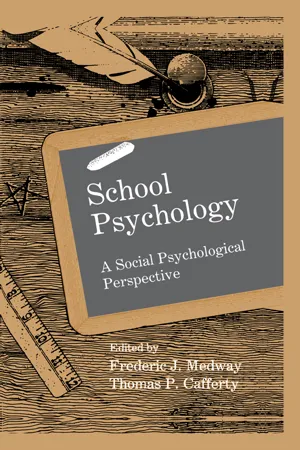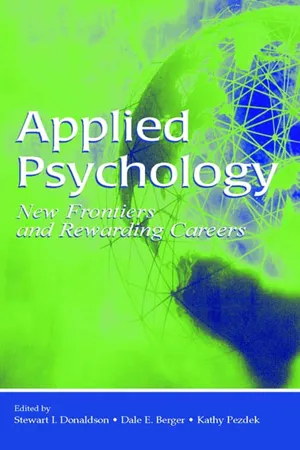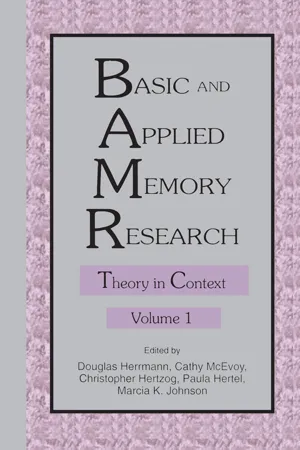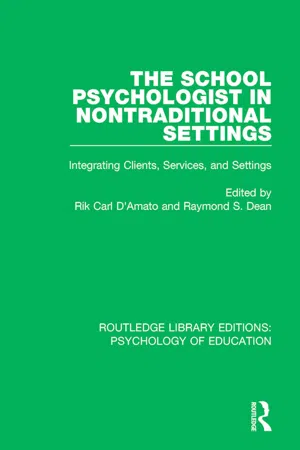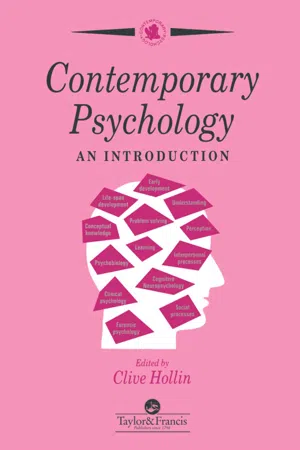Psychology
Applied Research In Psychology
Applied research in psychology involves using psychological principles and theories to address real-world problems and improve people's lives. This type of research focuses on practical applications, such as developing interventions for mental health issues, improving educational strategies, or enhancing workplace productivity. It aims to directly impact individuals, organizations, and communities by translating psychological knowledge into tangible solutions.
Written by Perlego with AI-assistance
Related key terms
8 Key excerpts on "Applied Research In Psychology"
- eBook - ePub
- Irving B. Weiner, Alice F. Healy, Robert W. Proctor(Authors)
- 2012(Publication Date)
- Wiley(Publisher)
In the foreword to the issue, the editors, Hall, Baird, and Geissler (1917), noted that at the time there already existed several journals and associations that had been established to serve the interests of psychology, but that “none of the existing journals devote themselves to the task of gathering together the results of workers in the various fields of applied psychology, or of bringing these results into relation with pure psychology” (p. 6). They implied that applied psychology did not command the same level of respect as did “pure” psychology, at least among some members of the profession: “The psychologist finds that the old distinction between pure and applied science is already obscured in his domain; and he is beginning to realize that applied psychology can no longer be relegated to a distinctly inferior plane” (p. 6). Contention about the relative merits of basic and applied work did not end with this observation; many in psychology and other sciences as well have continued to project attitudes of superiority with respect to their own approach to research, whether driven primarily by theoretical or practical concerns.Current Interest in Applications
We believe that interest in seeing the results of psychological research applied to practical problems is high at the present time among research psychologists and organizations that represent them. In 1992, the Association for Psychological Science identified, under the “Human Capital Initiative,” six priority areas for psychological research: productivity in the workplace, schooling and literacy, the aging society, drug and alcohol abuse, health, and violence in America (APS Observer, 1992). Over the next few years, the association published, in special issues of the APS Observer, six reports as follow-ups to the announcement of the initiative. These reports are available from the communications office of the Association for Psychological Science, or they can be downloaded from http://iupsys.net/index.php/iupsysresources/65-human-capital-initiative/1364-reports .Another evidence of current interest in drawing attention to the practical applications of the results of psychological research is the practice of the American Psychological Association of issuing press releases regarding research findings that have been published in APA journals and that are deemed to be of public interest. Recent releases mention findings regarding stress and health, mental aging, personality and cheating, improving memory, gender differences in chronic pain, and violent video games and aggression. Copies of releases can be accessed on the website, www.apa.org/news/press/releases/index.aspx - eBook - ePub
School Psychology
A Social Psychological Perspective
- Frederic J. Medway, Thomas P. Cafferty, Frederic Medway(Authors)
- 2013(Publication Date)
- Routledge(Publisher)
These three, seemingly disparate quotes by psychologists Hall, Milgram, and Heider summarize much of how we feel about the purpose and function of research in school psychology. To us, research involves a systematic plan to formulate a question and to discover one or more possible answers to it. The answers to human problems may be readily apparent or not, but rarely are they simple. Research plans and methods are necessary to understand the world in which we live and the people in it, to discover new laws, and verify ones that we suspect from common sense and observation. Our definition of research is intentionally broad and not limited to controlled experimentation. It does involve the motivation to accumulate facts and subsequently to link, sort, and analyze them, and a willingness to describe the process. Without plans to solve problems and a knowledge of how to conduct, evaluate, and apply research to find answers, the practice of school psychology would be chaotic.Research in school psychology rests on the methodological foundations of experimental design, statistics, and measurement theory (cf. Bailey, 1987; Barlow, Hayes, & Nelson, 1984; Campbell & Stanley, 1963; Cook & Campbell, 1979; Mason & Bramble, 1989; Selltiz, Wrightsman, & Cook, 1976). Numerous books and articles have been written in the last 15 years on conducting and implementing research in school psychology (Kratochwill, 1978; Kratochwill, Schnaps, & Bissell, 1985; Phillips, 1987, 1990) and an entire issue of the School Psychology Review edited by Witt in 1987 was devoted to the topic. Rather than reviewing a wide variety of social research methods or covering the implementation and acceptability of research findings (cf. Reimers, Wacker, & Koeppl, 1987), issues that have been adequately covered in the school and educational psychology literature, in this chapter, we focus on the specific application of social psychological research to school psychology.Our coverage begins by looking briefly at the present status of research in school and social psychology. We examine the extent to which school psychologists make use of social psychological research methods and attempt to address some reasons accounting for this historical lack of cross fertilization. Before turning to specific research issues and methods, we first look at the nature of research “paradigms” and review the assumptions of research in social and school psychology. Next, we consider the social psychology of school experimentation, including the effects of context and cognition on our data. And finally, we provide an overview of social psychological research methods that have particular relevance for school psychologists. Our review here is selective due to space considerations. However, we attempt to cover areas, such as qualitative methodologies and content analysis, that have not been reviewed for school psychologists. - eBook - ePub
Education and Psychology in Interaction
Working With Uncertainty in Interconnected Fields
- Brahm Norwich(Author)
- 2002(Publication Date)
- Routledge(Publisher)
I have discussed different kinds of psychologies which arise in different institutional settings. Where professional psychologists work in service settings, such as hospitals, clinics, workplaces and schools, there are demands for psychologies which relate to the individual confronting particular types of problems. Academic psychologists based in universities have to maintain the scientific credentials of the field in relation to other scientific fields. Applied psychology was seen to relate to both the application of knowledge from basic research and the application of systematic empirical methods directly to everyday problems. But psychological theory has also been generated by practitioners, especially in the mental health area—what I called psychology-in- practice, which often involved interpretivist approaches. Historical perspectives on psychology also suggest that there are connections between broad approaches in the field and different traditions in Western thought, the ontological and pragmatic traditions. In the pragmatic tradition, psychological ideas and techniques were developed within the range of practical disciplines, including education, well before the era of scientific psychology based in universities.In arguing for co-existence between interpretivist and causal explanatory models, it is also important to note the connections between the principles of human agency and causal determinism. Rather than setting these as simple opposites, it is possible to see how they depend on each other. From one side, causal mechanisms can give rise to human agency, though this implies that agency operates within certain constraints. From the other side, deterministic causal mechanisms cannot be used to intervene in practical settings, unless we assume some degree of human agency in actively seeking knowledge of such mechanisms. But critiques of causal scientific psychology have also centred on the individualism of mainstream psychology. The individual person is presented in the critiques as being indivisible from the social context. The problem with this way of formulating the relationship between individual and context is that it could be taken to mean that there is no place for personal continuity across different contexts, or for personal agency. The relationship is better seen as one of interconnection and mutual interaction. Indivisibility also treats the social context as of one kind, not distinguishing between micro- and macro-social levels of analysis. Other critiques have identified individualism in psychology with narrow brutish egoism. Against this I argued that there has been a confusion between antisocial egoism and the ideals of responsible individualism expressed in humanistic psychologies. What these critical psychologies, including feminist psychologies, have contributed is a greater understanding of the social uses and abuses of knowledge generated in the name of psychology. But this appreciation does not imply that the individual person should be regarded as wholly a social creation without any recognition of the biological aspects of our common humanity. - eBook - ePub
Applied Psychology
New Frontiers and Rewarding Careers
- Stewart I. Donaldson, Dale E. Berger, Kathy Pezdek(Authors)
- 2012(Publication Date)
- Psychology Press(Publisher)
chapter 7 , you will find many grounded examples of how developmental psychological science is used to promote the well-being of students from diverse cultural backgrounds in the U.S. educational system. Finally, the chapter does an excellent job of showing the interplay between basic and applied research, and how basic developmental psychological science can be applied toward social betterment.In chapter 8 , Sherylle J. Tan and Diane F. Halpern discuss some of the challenges involved with using findings from psychological research to influence the public and public policy. In general, they argue that the public distrusts science and scientists, preferring to rely on their own personal experiences and anecdotes. The new frontier they explore in this chapter involves methods, strategies, and techniques for improving the acceptance and impact of psychological research in the public domain. The applied psychologist of the 21st century is challenged to better disseminate research findings, to build stronger partnerships with the media, to take a much stronger role in educating the public about psychological research, and to improve communication and collaboration with communities.Careers
As we talk about the rise and promise of applied psychology with undergraduate students, prospective graduate students, and the next generation psychological scientists, students often wonder what kind of career options and opportunities might exist for them in applied psychology. Therefore, in the next set of chapters, we explicitly asked the authors to help the readers understand some of the career opportunities in their domain of applied psychology. Most of the chapters begin with an overview of the research and applications in an important subarea of psychology, and then provide a discussion of ways to get involved and to develop personally rewarding careers in applied psychology.In chapter 9 - eBook - ePub
Basic and Applied Memory Research
Volume 1: Theory in Context; Volume 2: Practical Applications
- Douglas J. Herrmann, Chris Hertzog, Cathy McEvoy, Paula Hertel, Marcia K. Johnson(Authors)
- 2013(Publication Date)
- Psychology Press(Publisher)
The greatest lesson I have learned from this experience is that it is absolutely necessary to conduct diverse research in order to understanding fully a problem in memory (i.e., basic, ecologically valid and practical research). Most of the strategies taught in the instructional packages we have encountered in school were first validated in laboratory studies, for example, the imagery strategy so prominent in in-school strategies instructional packages of today can be traced back to research in the 1970s exploring whether imagery instructions affected memory of text, including work that I conducted (e.g., Pressley, 1976). That work in turn descended from even more basic research on imagery, such as the many studies of dual coding summarized by Paivo (1971). In addition, the direct explanation approach at the heart of the inschool instruction we have been studying owes much to many basic studies that demonstrated strategies can be taught using explanations and modelling (see Pressley, Heisel, McCormick, & Nakamura, 1982). There is no way that in-school strategies instruction would exist in anything like its current state without the previous basic research. Even so, there is no way that in-school strategies instruction could be understood based on the laboratory studies alone.The whole point of real-life applied research, however, is that it leads to development and evaluation of a product, whether it be interview procedures for police, teaching materials for teachers, eyewitness expertise, instruments for helping the elderly, or so on. Applied research, in other words, can be either developmental (aiming to creating a product) or evaluative (aiming at assessing the effectiveness of a product), although, of course, the two interact in that evaluation is likely to lead to further modification and development. Yet even if real-life applied research is grudgingly allowed as a legitimate, if second-rate, academic exercise, the development of actual products certainly does not come within the remit of the academic psychology reward system. It is just about acceptable to carry out research that may be helpful as long as you do not actually help anyone! Ultimately, what is not rewarded will not flourish, and the whole rationale for conducting applicable and applied research will cease to exist. Although increasing involvement by those outside academic life in memory application is wholly to be welcomed, as Gruneberg (1992) argued elsewhere it is academic psychologists who are often best placed to understand principles that will make application successful by virtue of their knowledge of the field. In any case, the number of those outside academic psychology who are skilled, interested, and in a position to develop application is minute compared to the situation in other sciences. If we want application to flourish, there is no choice at present but to encourage real-life application by basic researchers. To those such as Banaji and Crowder who argue that this is not science, we would reply that real-life application is the lifeblood of science, and that without application there would be no science. Unless some of us, some of the time, seek to emulate Fleming, Marconi, Brunei, Stephenson, and Edison, our whole academic endeavor will come to be seen as sterile and self-indulgent. - eBook - ePub
The School Psychologist in Nontraditional Settings
Integrating Clients, Services, and Settings
- Rik Carl D'Amato, Raymond S. Dean(Authors)
- 2017(Publication Date)
- Routledge(Publisher)
What is likely to happen if an applied educational psychology emerges in school psychology is the creation of a new set of dialectics, this time based less on education versus psychology and more on polarities intimately related to the issues faced by a revised view of what problems are to be resolved and what approaches are most suitable to their resolution. For instance, an applied educational psychology will undoubtedly find differences within its own researchers and practitioners on such issues as whole person versus person as student only, emphasis on teacher or on learner, teacher versus learner control, knowledge as content versus knowledge as process, intrinsic versus extrinsic motivation, learning as holistic versus learning as molecular, learning as social versus learning as individual (Berlak & Berlak, 1981), and setting emphasis versus person emphasis. Differences among researchers and practitioners about behavioral, cognitive, or dynamic theory preferences will continue to exist. All theoretical/research approaches are applicable to applied educational psychology as they are to all other practitioner specialties. But the major concerns and questions raised and the debates and differences among those involved will be different from those raised in other human service provider specialties in psychology. That difference is what can make a difference!Applied educational psychologists need not delete mental health approaches to problem solving from their repertoires. The change in approach is akin to the current mental health model using teaching as one modality within a mental health model of prevention and treatment. The applied educational psychologist would consider use of mental health modalities (e.g., well recognized mental health counseling approaches) as one way among others to help a person develop knowledge or skills needed in order to deal with the difficulty at hand.What in actuality would an applied educational psychologist do that is different from what would be done by any other human service provider in psychology? Any psychologist in any setting will be asked to deal with problem behavior. The answer is in what the applied educational psychologist as instrument - eBook - ePub
Applying Psychology
The Case of Terrorism and Political Violence
- Orla Lynch, Carmel Joyce(Authors)
- 2018(Publication Date)
- Wiley-Blackwell(Publisher)
1998 ). Understanding why this may be the case is not only linked to the need to apply psychology to major social issues, but also to the dynamics of problem definitions inherent in research. For example, the more powerful party (the funder, the researcher, government, etc.), who may well be commissioning or carrying out the analysis, may have fixed ideas about the roots of the problem and so may seek changes based on these assumptions. In such a case, the more powerful party is not conceived of as part of the problem definition and so not an integral element in the problem definition. Therefore, applying psychology in this instance is mirroring the assumptions around the cause of the problem (a very narrow perception of cause). This is clearly relevant to the case of terrorism research as the subject of the investigation is predominantly the individual or group rather than, for example, the state and its policies.Furthermore, the impact of applying psychology can be significant; however, psychology cannot address every element of a complex social issue. Given the scientific ideals that psychology as a discipline was founded upon, meeting the demands for real‐world applicability challenges the assumptions of control, objectivity, replication, and measurement that are inherent in much psychological research (Ash, 2005 ). While significant developments have occurred within psychology, particularly in relation to action research (Camic, Rhodes, & Yardley, 2003 - eBook - ePub
Contemporary Psychology
An Introduction
- Clive Hollin.(Author)
- 2006(Publication Date)
- Taylor & Francis(Publisher)
et al., 1984). This refers to the process of using scientific methods to direct clinical practice, which in turn contributes to the body of knowledge about presenting problems.As Barlow et al. (1984) depict it, the scientific element of practice involves three primary and interrelated activities or roles for practitioners. In the first of these roles the practitioner is a consumer of new research findings (for example relating to as new assessment or treatment techniques) that he or she will put into practice. In the second role the practitioner is an evaluator of his or her own interventions through the use of empirical methods. In the third role the prac-titioner is a researcher producing new data to be reported to the scientific community.The scientific process begins with the development of theories which seek to explain the occurrence of a particular problem or phenomenon. Very often theories are themselves influenced by earlier ideas or the results of previous study. In clinical psychology theories guide and influence the methods that practitioners use to understand and modify an individual’s behaviour and are continually being proposed, modified, accepted or abandoned in response to clinical findings. The theories most valued by clinical psychologists (a) have some relevance to clinical problems, (b) have implications for the treatment of those problems and (c) are presented in terms that can generate hypotheses that can be tested. A good theory is one that can be ‘falsified’ or proved wrong by this process.The methods and procedures that clinical psychologists use to test out theories must also conform to the standards required of a science aimed at ‘falsification’. The end result of this scientific procedure for clinical psychologists is that they use treatment methods with their clients that have been shown to be effective or at least are being closely studied in terms of their effectiveness.
Learn about this page
Index pages curate the most relevant extracts from our library of academic textbooks. They’ve been created using an in-house natural language model (NLM), each adding context and meaning to key research topics.

